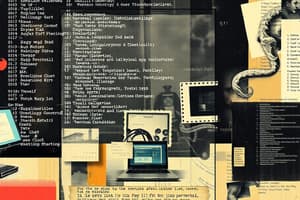Podcast
Questions and Answers
What is the purpose of variables in programming?
What is the purpose of variables in programming?
- To perform mathematical operations
- To store fixed values
- To display output to the user
- To serve as containers for information that can be altered (correct)
Which data type is used for decimal numbers in programming?
Which data type is used for decimal numbers in programming?
- Integer
- String
- Boolean
- Floating-point numbers (correct)
What is the purpose of conditional statements in programming?
What is the purpose of conditional statements in programming?
- To perform repetitive tasks
- To create programs that can make decisions based on certain conditions (correct)
- To declare variables
- To handle input from the user
Which function is commonly used for displaying output in programming?
Which function is commonly used for displaying output in programming?
What fundamental concept do loops like while and for enable in programming?
What fundamental concept do loops like while and for enable in programming?
How do functions contribute to code organization and readability?
How do functions contribute to code organization and readability?
Which programming concept involves modifying strings, performing comparisons, and extracting substrings?
Which programming concept involves modifying strings, performing comparisons, and extracting substrings?
What do lists enable students to do in programming?
What do lists enable students to do in programming?
How does Object-Oriented Programming (OOP) enhance program structure?
How does Object-Oriented Programming (OOP) enhance program structure?
Why is understanding problem-solving techniques essential in programming?
Why is understanding problem-solving techniques essential in programming?
Flashcards
String
String
A variable that can hold a sequence of characters, like words or sentences.
Variable
Variable
A container that stores a value which can be changed during program execution.
Data Type
Data Type
A category of data that defines the type of information a variable can hold.
Input
Input
Signup and view all the flashcards
Output
Output
Signup and view all the flashcards
Conditional Statements
Conditional Statements
Signup and view all the flashcards
Loops
Loops
Signup and view all the flashcards
Functions
Functions
Signup and view all the flashcards
Lists
Lists
Signup and view all the flashcards
Object-Oriented Programming
Object-Oriented Programming
Signup and view all the flashcards
Study Notes
11th Computer Application Second Revision Question Paper: Tamil Medium's Enchanting World of Programming Concepts
The 11th Computer Application second revision question paper in Tamil medium dives deep into the realm of programming, where intricate concepts form the bedrock of modern digital technology. As we explore the topics covered in this paper, we'll uncover the fundamental building blocks of programming, laying the groundwork for students to create and understand computer programs effectively.
Variables and Data Types
Students will encounter the concept of variables, which serve as containers for information that can be altered during the program's execution. They will also gain familiarity with data types, such as integers, floating-point numbers, strings, and Booleans, which determine how variables can be used and manipulated within a program.
Input and Output
Understanding how to handle input from the user and display output in meaningful ways is an essential part of programming fundamentals. Students will learn about input/output (I/O) statements and functions, such as input() and print(), in programming languages like Python and Java.
Conditional Statements
Conditional statements, such as if, else, and elif, enable the creation of more complex and dynamic programs. By using these constructs, students will be able to write code that performs different actions based on the evaluation of certain conditions.
Loops
Loops, such as while and for, enable programs to execute a set of instructions repeatedly. This fundamental concept is crucial for tasks like calculating sums, printing lists, and iterating through elements in an array.
Functions
Functions, which can be thought of as reusable pieces of code, help students organize and improve the readability of their codebase. They also allow for code to be written once and used multiple times, improving efficiency.
String Manipulation
Strings, which consist of characters, are an integral part of programming. Students will learn how to modify strings, perform comparisons, and extract substrings. They will also learn how to use string functions, such as len() and strip(), to manipulate strings effectively.
Lists and Arrays
Lists, which are collections of elements enclosed in square brackets, enable students to store and manipulate multiple pieces of data simultaneously. Students will learn how to create, access, and manipulate lists and arrays.
Object-Oriented Programming
The concept of object-oriented programming (OOP) allows students to structure their programs in a more organized and modular fashion. By using objects, classes, and methods, students will learn how to create more cohesive and maintainable code.
Problem Solving and Algorithms
Understanding problem-solving techniques and developing algorithms to solve problems is an essential part of programming. Students will learn how to break down problems into smaller, manageable subproblems and develop solutions that are both efficient and effective.
In conclusion, the 11th Computer Application second revision question paper in Tamil medium offers students a comprehensive understanding of programming fundamentals. By mastering these concepts, students will be well-equipped to create and analyze computer programs, solve problems, and contribute to the world of technology with confidence and creativity.
Studying That Suits You
Use AI to generate personalized quizzes and flashcards to suit your learning preferences.
Description
Dive deep into the realm of programming with the 11th Computer Application second revision question paper in Tamil medium. Explore variables, data types, conditional statements, loops, functions, string manipulation, lists, object-oriented programming, problem-solving, and algorithms to build a solid foundation in programming concepts.



